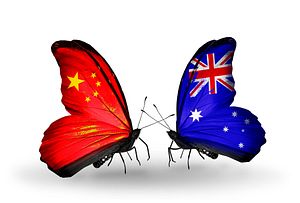On Monday, Australia and Japan sealed a free trade agreement after seven years of negotiations. On Tuesday, Australia and South Korea officially signed their own FTA. Not to be outdone, China is pushing for a rapid conclusion to its own FTA negotiations with Australia.
Australian Prime Minister Tony Abbott arrived in southern China for a bilateral meeting with Chinese Premier Li Keqiang. Abbott will also attend the Boao economic forum, held each year in China’s Hainan province. During their meeting, Abbott and Li agreed to accelerate negotiations over a free trade deal. Li expressed his hope that “the two sides advance relevant negotiation in the spirit of mutual benefit, pragmatism and mutual accommodation, in efforts to score an balanced and high-level agreement.”
China and Australia agreed to begin FTA negotiations on April 18, 2005. Nearly nine years later, the negotiations have still not concluded, despite the fact that Australia began and concluded FTA negotiations with Japan and Korea during that same time.
Abbott, however, has made finalizing the China-Australia FTA a priority. Prior to assuming office in September of last year, Abbott promised to conclude major regional free trade deals within a year. With the deals with South Korea and Japan now finished, Abbott has set his sights on wrapping up negotiations with China. Last October, during the APEC meetings in Bali, Indonesia, Abbott told reporters, “I have to say I would be disappointed if we can’t conclude a significant FTA with China within 12 months.”
Abbott in part blamed the delay on the previous Australian government. He pointed to the benefits New Zealand has reaped from its own FTA with China, and said that Wellington moved much more quickly through the negotiation phase than Canberra has. “I think we can do a lot better than that,” he said.
For its part, China has also made concluding regional trade deals a high priority for itself. In addition to talks with Australia, China is currently working with Japan and Korea on a trilateral FTA, while also undertaking a joint feasibility study for a China-Korea FTA. In his government work report at March’s National People’s Congress, Li tagged these potential FTAs as a key part of China’s economic development. Accordingly, Li promised to “accelerate free trade area negotiations with the Republic of Korea, Australia, and the Gulf Cooperation Council.”
The public enthusiasm of both governments for a China-Australia deal certainly makes an eventual agreement more likely. However, obstacles remain.
One major impediment is Chinese concern over Australia’s process for admitting foreign investment. Currently, the Foreign Investment Review Board in Australia requires approval for investments of any amount from state-owned enterprises (SOEs)—adding an additional level of bureaucracy for many of China’s largest businesses seeking to invest in Australia. China negotiators are pushing for a higher threshold, hoping that investment of less than A$1 billion can be exempt from review.
For its part, Australian investors also complain about Chinese policies that limit their access to key industries, especially those dominated by SOEs. Australian manufacturers are also concerned that an FTA would flood Australian markets with cheaper Chinese goods, hurting domestic industries. Australia, thanks to its commodities and agricultural exports, has historically enjoyed a trade surplus with China. In 2012, for example, Australia exported A$78.7 billion (US$ 73.6 billion) worth of goods to China and imported A$46.3 billion (US$43.3 billion). A FTA could reverse the trade balance in China’s favor, some in Australia fear.

































